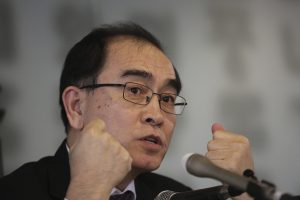On April 15, South Koreans will vote in National Assembly elections. While the coronavirus will be prominent on every voter’s mind as they head to the polls, a change in South Korea’s electoral law means that there will also be an increasing number of political parties to choose from — including a political party founded by refugees from North Korea.
Voting in South Korea consists of a mixed system that allows voters to select a candidate for their individual district, but also to vote for the political party of their preference. Of the 300 members in the National Assembly, 253 members are directly elected and 47 are elected via party lists based on votes for political parties. The electoral reform was designed to improve the chances of proportional representation seats being awarded to minor political parties.
In advance of this year’s National Assembly elections, a group North Korean refugees established the South-North Unification Party (SNUP) to give refugees from North Korea a voice in South Korean politics and work to improve the livelihoods of North Korean refugees who have moved to the South.
Despite South Korean state aid for North Koreans to transition to society, many still struggle relative to their South Korean counterparts. While the average monthly salary of North Korean refugees continues to rise, it lags the average for South Koreans by around 600,000 won (around $500) per month. North Koreans also face higher levels of unemployment. The economic challenges that North Koreans face in South Korea were highlighted last year by the tragic death last year of a mother and son who died of starvation.
This isn’t the first time that North Koreans have sought political office in the South. In 2012, Cho Myung-chul became the first North Korean defector to serve in the National Assembly when he won a proportional representation seat for the New Frontier Party, now the United Future Party (UFP). However, the formation of the SNUP is the first time that there have been efforts by North Korean refugees to form their own political party.
With only 33,500 North Korean refugees in South Korea, the new party will need expand its support beyond refugees and to reach out to South Koreans. With this in mind, in launching their party the SNUP organizers said, “We will create a party that can encompass both the commonalities and differences of all 80 million people of the South and the North … We will also address the worst human rights violations and the miserable realities of North Korean people living unaware of freedom and human rights.”
In the current elections, the SNUP is running just two proportional representation candidates and has a party platform with policies designed to appeal to South Koreans more generally. These include proposals for a basic income of 700,000 won and a basic housing income for lower income individuals, as well as a shorter working day and a proposal to implement a form of free college tuition.
For North Korean refugees, the party is calling for increased support through the Hanawon program that transitions North Koreans into South Korean society.
With most North Korean refugees opposed to the regime in Pyongyang, the party is also looking for a voice in North Korea policy and hope to see greater continuity in that policy from administration to administration. They are also pushing policies for unification that would require that aid be provided to the people in North Korea rather than the regime, and that there be a stronger institutional framework to promote human rights in North Korea.
In addition to the SNUP, two other North Koreans are running for office. Thae Yong-ho, the former deputy chief of mission to North Korea’s embassy to the United Kingdom and one of the more prominent North Korean defectors, is running in the Gangnam A district as the candidate for the opposition United Future Party. This is the first time that a North Korean has run as a candidate in an individual district. Ji Seong-ho, who attended President Donald Trump’s State of the Union Address in 2018, is running for a proportional representation seat for the UFP.
Polling suggests that it is unlikely that the SNUP will win a seat in the National Assembly, though as candidates for a mainstream party Thae and Ji may be more successful. However, the SNUP’s formation is still an important milestone for North Korean refugees in the political process. While the SNUP might not be successful this election, its formation raises questions about what is the best way to represent the needs of North Koreans in South Korea and whether South Koreans are willing to support a political party led by refugees from the North.

































